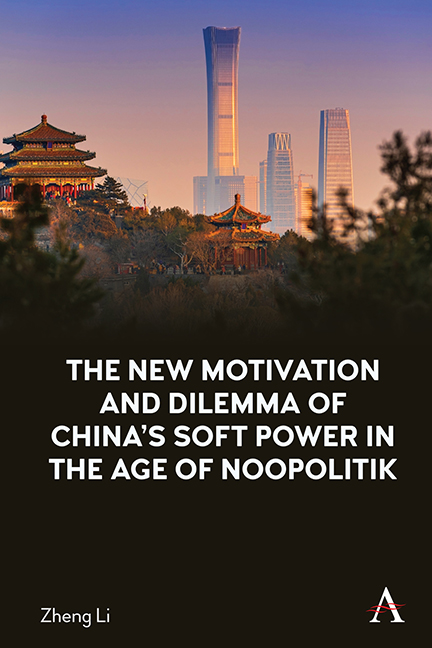Book contents
- Frontmatter
- Contents
- List of Figures and Tables
- List of Abbreviations and Acronyms
- 1 The Anti-Corruption Campaign and the Chinese Dream
- 2 Debating Governance and the Rule of Law: China’s Narrative and Images in Western Countries
- 3 Soft Power and Sharp Power in the Age of Noopolitik
- 4 Methodology
- 5 The Framing of Governance: the China Model and the Chinese Dream
- 6 When ‘House of Cards’ Meets ‘in the Name of People’: Framing China’s Anti-Corruption Campaign
- 7 Discussion and Conclusion
- Notes
- References
- Index
3 - Soft Power and Sharp Power in the Age of Noopolitik
Published online by Cambridge University Press: 06 October 2022
- Frontmatter
- Contents
- List of Figures and Tables
- List of Abbreviations and Acronyms
- 1 The Anti-Corruption Campaign and the Chinese Dream
- 2 Debating Governance and the Rule of Law: China’s Narrative and Images in Western Countries
- 3 Soft Power and Sharp Power in the Age of Noopolitik
- 4 Methodology
- 5 The Framing of Governance: the China Model and the Chinese Dream
- 6 When ‘House of Cards’ Meets ‘in the Name of People’: Framing China’s Anti-Corruption Campaign
- 7 Discussion and Conclusion
- Notes
- References
- Index
Summary
Introduction
According to Nye (2004), soft power is the ability to get what you want through attraction rather than coercion or payments. Chitty (2017) considers this term with a different orientation and introduces two new concepts, ‘internal soft power’ and ‘external soft power’. The two concepts refer to domestic governance and its influences overseas, respectively. Based on the theory, I will build the theoretical framework with the relevant ideas from the extant literature on power, governance and public diplomacy. The chapter begins with the elaboration on the theoretical foundation for research methodology. It also thoroughly discusses how symbolic interactionism and constructivism shape the relevant research stances. The two core concepts of the framework, internal and external soft power, are examined from two perspectives. First and foremost, I will review the literature on the relationship between soft power, domestic politics and international norms. Next, I will discuss how a country wields soft power thorough public diplomacy. Later, I will explain why I adopt framing theory to build the framework and analyse data in this study. In the end, the proposed theoretical framework will be provided.
Theoretical Foundation of the Framework
The foundation of research is ‘concerned with matters of knowing and being rather than method per se’ (Schwandt, 1994, p. 222). Next, I will elaborate on the epistemological position and theoretical perspective of research. The study adopts the framework by Crotty (Crotty, 1998) to build its research foundation. According to Crotty, the research process falls into four essential elements: epistemology, theoretical perspective, methodology and methods. Epistemology here refers to how knowledge is recognized, the ‘way of understanding of how we know what we know’ (Crotty, 1998, p. 10). It gives rise to another element: Theoretical perspective, an approach to explaining the object and the philosophical stance. It aims to grounds a series of assumptions. The methodology refers to the systematic paradigm that decides the selection and operationalization of methods. Research methods are practical ways of data collection in fieldwork and the corresponding analysis (Crotty, 1998). The framework provides a structure that locates research identification and shapes a consistent process of knowledge generation. Their relationship is presented in Figure 2.
- Type
- Chapter
- Information
- The New Motivation and Dilemma of China's Internal Soft Power in the Age of Noopolitik , pp. 47 - 82Publisher: Anthem PressPrint publication year: 2022

